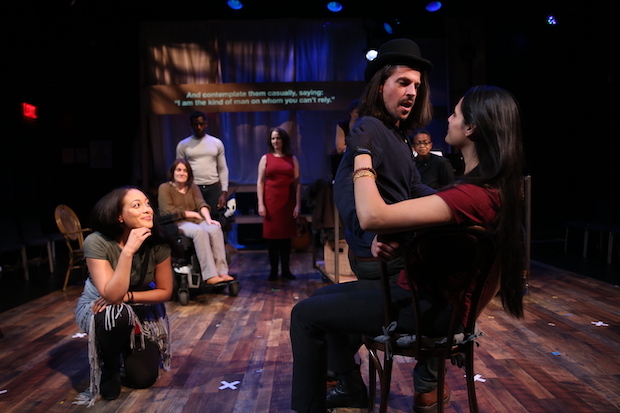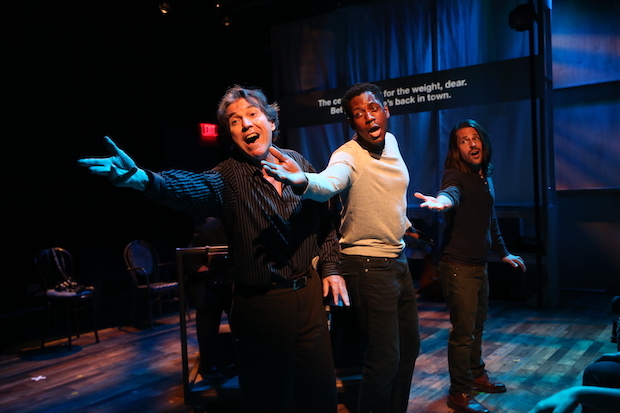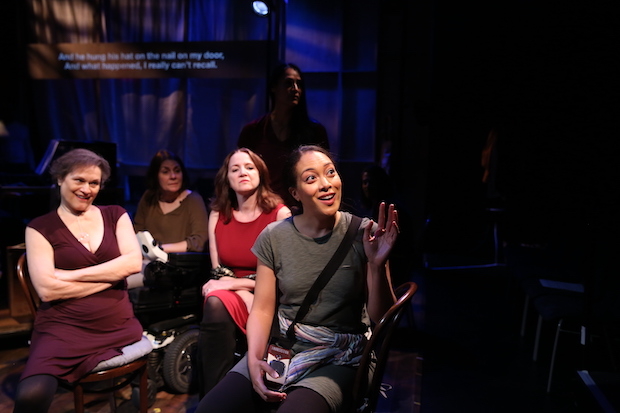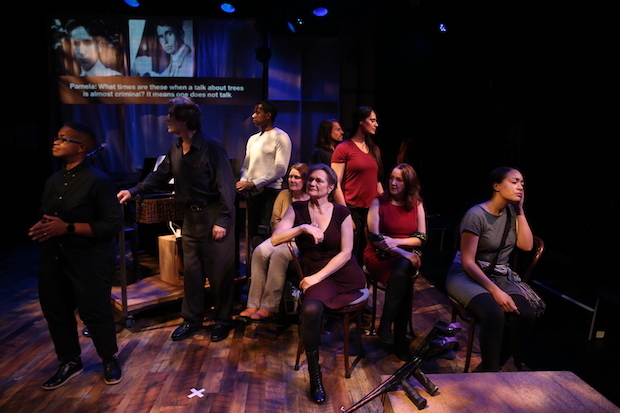Review: Brecht on Brecht Sings of Revolution Past, Present, and Future

(© Carol Rosegg)
As theater companies emerge from the pandemic, they will naturally gravitate toward places of comfort: things they do well, or have done well before. For Theater Breaking Through Barriers, that is Brecht on Brecht, a show that had been slated to perform April 2020 anyway, which has now finally opened at A.R.T./New York Theatres. Artistic director Nicholas Viselli (who helms this revival) was an actor in the company's 2002 production, back when it was known as "Theater By The Blind."
In his review of that production, my colleague David Finkle remarked that Bertolt Brecht's Marxist views were "somewhat dated," which they must have seemed a decade after the collapse of the Soviet Union. But two decades after that, with the "end of history" firmly in the rearview mirror, and collective anger at all manner of injustice at a boiling point, does Brecht have something to tell us?

(© Carol Rosegg)
Oh boy, does he. Through poems, letters, essays, and play excerpts, Brecht on Brecht offers an avalanche of thoughts on war, science, dissent, populism, and the plight of regular folks who toil in the shadows of history's "great men." All of it is delivered in Brecht's signature style, in which the actors never lose themselves in their roles, but the stage still overflows with epic poetry and music. If you find rhyming couplets irritating in comedy, wait until you hear them deployed in a serious scene about infanticide.
Short vignettes come together to form a blurry mosaic of the playwright's life, much of which was spent in exile, just one step ahead of Hitler's Wehrmacht. The result is a Brechtian jukebox musical: We hear some of the playwright's greatest hits (like "Mack the Knife," one of his many collaborations with Kurt Weill). We also hear a highly selective version of his biography. But the show is never completely satisfying as either bioplay or theatrical revue.
Some of this is baked into the script, devised by George Tabori in 1961 for a production that starred Lotte Lenya. It jumps from scene to scene, rarely giving us time to process what we've just witnessed. It's like having a conversation with a brilliant, restless mind who won't let you get a word in edgewise. Brecht comes across like a red Polonius, even more so in this revival due to the removal of The Jewish Wife, a one-act play typically performed as part of Brecht on Brecht that adheres to more conventional forms of theater. I suspect that audiences with no prior knowledge of Brecht will feel hopelessly adrift through large parts of this remounting.

(© Carol Rosegg)
This is despite a sharp, energetic staging from Viselli. Unlike certain other stagings of Brecht, Viselli clearly takes both the form and content of the author's work seriously, leading his cast to earnest yet emotionally clear-eyed performances. An upright piano on a rolling platform constitutes the central element of Bert Scott's versatile scene design, transforming into Mother Courage's cart (and then back again) within the first few minutes. Scott's cabaret lighting provides a moody atmosphere for the musical numbers, while keeping it dim enough for Samuel J. Biodolillo's projections: A recurring video of Brecht testifying before the House Un-American Activities Committee serves as an essential spine for the show, allowing us to hear from the man himself (sound design by Eric Nightengale).
Throughout, Viselli remains committed to accessibility: The actors describe themselves at the top of the show for blind patrons, and supertitles appear on the upstage wall for deaf patrons. An ensemble of nine performers of various abilities and disabilities cheerfully obliterates the notion that you have to be completely able-bodied in order to appear in musical theater. Brecht certainly would have dug that.

(© Carol Rosegg)
Individual performances glimmer like stars through the fog of Brecht on Brecht: Dionee McClain-Freeney not only leads the ensemble to adequate musical performances as music director, but she delivers a stirring monologue on the nature of exile (a projected photo of Haitian migrants at the southern border brings this speech directly into 2021). The three men of the cast (Scott Barton, Sean Phillips, and Stephen Drabicki) sing a beautiful rendition of "In Memory of Marie A." Fareeda Pyracha Ahmed has a gorgeously smoky voice that sounds perfect in Brecht's musical collaborations with Weill and Hanns Eisler. In a scene about the threat posed by the Nazis, Ann Marie Morelli hilariously portrays a prescient potato, wearing a bouquet of spuds on her head like a Mitteleuropean Carmen Miranda (simple, effective, yet imaginative costumes by Courtney E. Uruyo). None of it fully compensates for the show's Brechtian muddle, though it does make 100 minutes go by pleasantly enough.
But was it ever Brecht's intention to be pleasant? My lasting mental image of Brecht on Brecht will likely be Anita Hollander's wide, somewhat terrifying grin as she and the rest of the cast sing "The Song of the Moldau," about the bubble bursting on an unjust status quo, ushering in a time when "the last shall be first." In her unabashed glee at the prospect of violent revolution, Hollander captures the true bite in Brecht's worldview — one that has little patience for liberal incrementalism, and which gains traction every day. Suddenly, Brecht doesn't feel so passé anymore.











